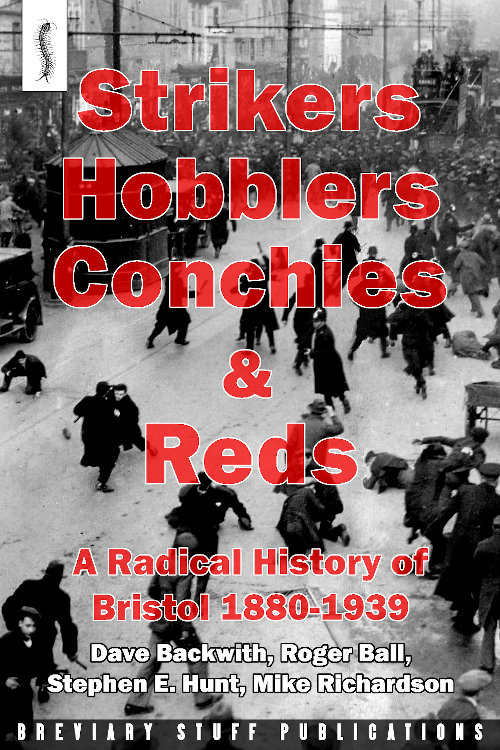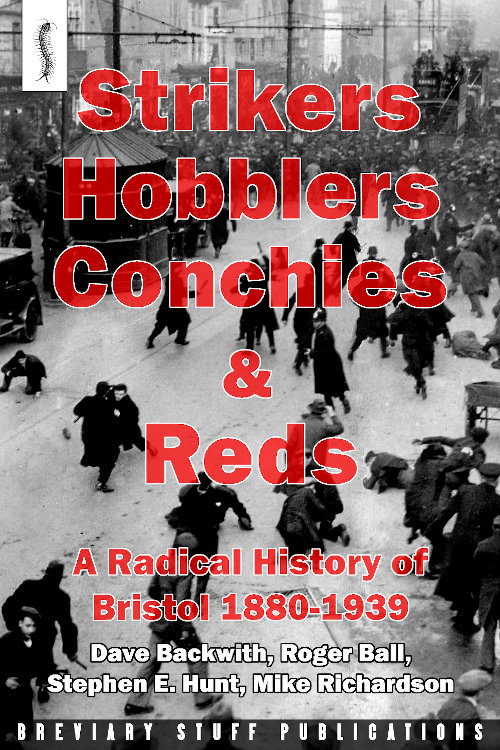- Illustrations
- Acknowledgements
- Contributors
- Introduction
- ♦ Anarchism in Bristol and the West Country: 1880-1939
- Stephen E. Hunt
- ♦ Pirates to Proletarians: the Experience of the Pilots and Watermen of Crockerne Pill in the Nineteenth Century
- Mike Richardson
- ♦ The Bristol Strike Wave of 1889-1890: Socialists, New Unionists and New Women — Part One: Days of Hope
- Mike Richardson
- ♦ The Bristol Strike Wave of 1889-1890: Socialists, New Unionists and New Women — Part Two: Days of Doubt
- Mike Richardson
- ♦ The Origins and an Account of Black Friday, 23rd December 1892
- Roger Ball
- ♦ Intermezzo: Coffee Taverns
- Stephen E. Hunt
- ♦ Bristol and the Labour Unrest of 1910-14
- Mike Richardson
- ♦ Yesterday's To-morrow: Bristol’s Garden Suburbs
- Stephen E. Hunt
- ♦ Bread or Batons? Unemployed Workers’ Struggles in Bristol in the 1930s
- Dave Backwith and Roger Ball
- Bibliography
- Index
Strikers, Hobblers, Conchies & Reds
£18.50
Dave Backwith, Roger Ball, Stephen E. Hunt, Mike Richardson
In the 1970s and 80s a revival of interest emerged in researching Bristol’s vigorous radical past, reflected in the publications of the Bristol branch of the Historical Association and Bristol Broadsides. This revival has continued, echoed in the more recent historical studies that have advanced the work of filling in Bristol’s remarkable past — especially the involvement of the Bristol women’s movement in the nineteenth century in anti-slavery campaigns, social reform, and the struggle for the emancipation of women, developing into the suffrage movement — but gaps in our knowledge still exist. This collection of essays from members of the Bristol Radical History Group traces the relationship between labour struggles and the new ideas and practice of general unionism, socialism and anarchism in Bristol and the surrounding area from the late nineteenth century through to the 1930s.
Anarchism in Bristol and the West Country looks at the gradual emergence of anarchism as a distinct political and cultural current within the wider labour movement from the late nineteenth century onwards.
Pirates to Proletarians charts the experiences of Bristol’s river pilots and their assistants in the nineteenth century, their struggle to defend their jobs and their traditional way of working, as steam power emerged to replace sail. Their relationship with the ship-owners, masters and city authorities was a complex one, which broke down periodically into open conflict.
The Bristol Strike Wave of 1889-1890, drawing on many new sources, presents a detailed picture of strikes in the city during September and December 1889 and the rise of ‘New Unionism’ as worker militancy exploded; it charts the occurrences of industrial conflict between January and August 1890, starting with the lockout of boot and shoe workers, and addresses the challenges faced by workers, and union and socialist organisers.
The Origins and an Account of Black Friday explores the employers counter-offensive of 1892-93, which was aimed at rolling back the recent gains made by Bristolian workers, whereby the Bristol bourgeoisie and their agents sought to intimidate strikers using lock-outs, violent policing, fines and imprisonment.
Intermezzo is a brief look into the coffee taverns of Victorian Bristol. It was in these institutions that Socialists, Anarchists and Trade Unionists read their ‘seditious’ publications, discussed politics and met to organise strike committees and campaigns. These cultural spaces were open to men and women and provided an environment which encouraged both freedom of thought and debate.
Bristol and the Labour Unrest of 1910-14 studies the experience of industrial strife between 1910 and the outbreak of the First World War, in August 1914. This period witnessed a significant increase in unofficial strike activity, as significant sections of the trade union rank-and-file began to express their frustration at the lack of progress made in their struggle for better working conditions and a new social order.
Yesterday’s To-morrow reveals the profound, yet now largely forgotten, influence of the garden-city movement in defining the urban morphology of the estates around Bristol’s residential periphery.
Bread or Batons? Unemployed Workers Struggles in Bristol in the 1930s looks back at the period of the last ‘great depression’. There are numerous parallels with our recent history, from cuts in poor relief and public services, a collaborationist and emasculated Labour opposition, to the brutal policing of demonstrations and a corrupt and reactionary media. It looks in detail at unemployed workers’ demonstrations in 1931-32 and their clashes with the police.





